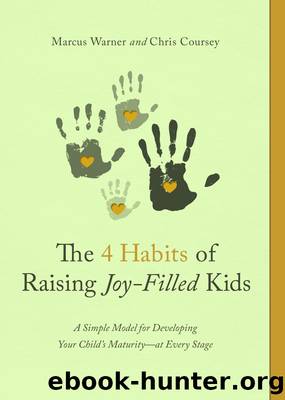The 4 Habits of Raising Joy-Filled Kids by Marcus Warner

Author:Marcus Warner [Warner, Marcus; Coursey, Chris M.]
Language: eng
Format: epub
Publisher: Moody Publishers
Published: 2021-09-15T00:00:00+00:00
THE WISDOM YEARS
Childhood begins with weaning. We stop depending on Mom to feed us and learn to feed ourselves. It ends with puberty and the physical transformation that prepares young adults to become parents. Puberty has long been recognized as the transition point between childhood and the adult years. Recently, people have pointed out that the developing brain is not fully formed until age twenty-five, but that does not change the fact that once a child hits puberty that child could physically become a parent very quickly if they havenât learned how to work for and wait for what is good. These are years for learning wisdom.
Babies can act like fools. Letâs face it. They have no idea what is good for them or bad for them. I remember coming home from a date with my wife to find my infant son crawling up the stairs with a butcher knife in his hands. He was giggling and happy with absolutely no clue that he could die if this didnât end well. The babysitter had made a pizza and used the butcher knife to cut it. Somehow, my active son had found a way to get it off the counter while everyone else was watching TV.
I tell this story because it illustrates the need for children to learn wisdom. My infant son had no idea that it was not good for him to crawl upstairs with a butcher knife in his hand. He thought it was the greatest thing ever! By the time our kids finish puberty (which usually happens around age thirteen) they need to be well practiced at taking care of themselves. This means they need to learn what is good for them and what is bad for them and how to anticipate consequences. Sometimes they learn through trial and error, and sometimes we need to instruct them and give consequences.
Letâs start with a definition of wisdom. I find it interesting that the Hebrew word for wisdom (chokmah) also means skill. It captures the idea that a wise person is skilled at the art of living. This is part of what inspired the ABCD model of parenting. These four categories guide parents in knowing what skills they need to pass on to their kids.
There are two core elements to wisdom: discernment and discipline. Discernment is the ability to distinguish between what is good for me and what is bad for meâwhat will end well and what will end poorly. It includes the ability to distinguish between what is temporarily pleasurable and what is truly satisfying.
Helping our kids learn what is satisfying has many benefits.
1. They learn that some things are worth working for.
2. They learn that some things are worth waiting for.
3. It strengthens their identity to know what they find satisfying.
4. It helps them be more creative.
5. They learn they can add value to the world around them.
Something is satisfying when it makes you smile to relive the experience, or you can still feel the joy of the activity several days later.
Download
This site does not store any files on its server. We only index and link to content provided by other sites. Please contact the content providers to delete copyright contents if any and email us, we'll remove relevant links or contents immediately.
Machine Learning at Scale with H2O by Gregory Keys | David Whiting(4291)
Never by Ken Follett(3935)
Fairy Tale by Stephen King(3368)
Reminders of Him: A Novel by Colleen Hoover(3075)
The Man Who Died Twice by Richard Osman(3070)
Will by Will Smith(2906)
Rationality by Steven Pinker(2349)
It Starts With Us (It Ends with Us #2) by Colleen Hoover(2337)
Can't Hurt Me: Master Your Mind and Defy the Odds - Clean Edition by David Goggins(2319)
Friends, Lovers, and the Big Terrible Thing by Matthew Perry(2218)
The Becoming by Nora Roberts(2188)
The Stranger in the Lifeboat by Mitch Albom(2111)
Love on the Brain by Ali Hazelwood(2059)
New Morning Mercies: A Daily Gospel Devotional by Paul David Tripp(1907)
A Short History of War by Jeremy Black(1841)
The Strength In Our Scars by Bianca Sparacino(1839)
HBR's 10 Must Reads 2022 by Harvard Business Review(1835)
A Game of Thrones (The Illustrated Edition) by George R. R. Martin(1711)
Never Finished: Unshackle Your Mind and Win the War Within by David Goggins(1701)
